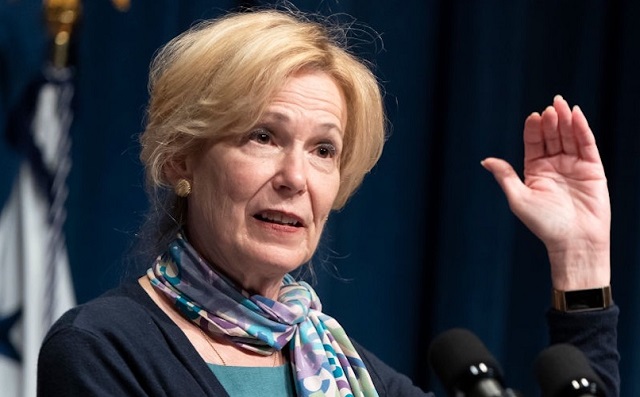Alberta
7 more Albertans die from COVID-19. 1,500 total cases. April 10 Update

From the Province of Alberta
Update 28: COVID-19 pandemic in Alberta (April 10 at 4:45 p.m.)
There are now 713 confirmed recovered cases of COVID-19 in the province.
With 49 new cases reported, the total number of cases in Alberta is 1,500.
Seven Albertans have died since the last report, bringing the total deaths in the province to 39.
Four of these deaths were residents at the McKenzie Towne continuing care facility.
Latest updates
- Albertans are strongly encouraged to stay home this long weekend.
- Cases have been identified in all zones across the province:
- 917 cases in the Calgary zone
- 386 cases in the Edmonton zone
- 97 cases in the North zone
- 72 cases in the Central zone
- 26 cases in the South zone
- Two cases in zones yet to be confirmed
- Of these cases, there are currently 48 people in hospital, 13 of whom have been admitted to intensive care units (ICU).
- 201 cases are suspected of being community acquired.
- Five new deaths are from the Calgary zone, bringing the total in this zone to 27. Two additional people have died in the Edmonton zone, bringing the number of deaths to seven in this zone. A total of four people have died in the North zone, and one person has died in the Central zone.
- There have now been 17 deaths at the McKenzie Towne continuing care facility.
- Stronger outbreak measures have been put in place at continuing care facilities. To date, 164 cases have been confirmed at these facilities.
- There have been 70,080 people tested for COVID-19 and a total of 72,370 tests performed by the lab. There were 2,123 people tested in the last 24 hours.
- Aggregate data, showing cases by age range and zone, as well as by local geographic areas, is available online at alberta.ca/covid19statistics.
- All Albertans need to work together to help prevent the spread and overcome COVID-19.
- Restrictions remain in place for all gatherings and close-contact businesses, dine-in restaurants and non-essential retail services. A full list of restrictions is available online.
- Albertans are prohibited from attending all public recreation facilities, including golf courses. Staff are allowed to maintain courses as long as they follow public health measures that prevent the risk of transmitting COVID-19. More information on these measures can be found online.
Updates to continuing care facility rules
As continuing care facilities are most at risk of experiencing serious effects from COVID-19, more stringent measures are being taken to protect residents and staff.
To further protect residents and staff from exposure to COVID-19 through asymptomatic individuals, continuing care workers will now be required to wear masks at all times when providing direct patient care or working in patient care areas.
Workers in long term care and supportive living sites will only be allowed to work at one site in an effort to reduce the spread between locations. These measures will take effect next week.
To protect and provide flexibility for both workers and employers as measures are implemented, the Minister of Labour and Immigration signed a Ministerial Order today. The Government of Alberta is considering financial supports for health care aids and facility operators to minimize the impacts of this change. Details will be communicated to providers and employees in the coming days.
Fact sheet for kids now available
Many parents and caregivers are getting questions from young people in their lives. To help respond, a new fact sheet is available online at Alberta.ca/COVID19. It is aimed at kids and their families and is meant to spur open, honest conversations with kids about coronavirus and the measures being taken to prevent the spread.
Temporary changes to legislation and regulations (Service Alberta)
Service Alberta is making temporary changes to several acts and regulations to help businesses, public bodies and non-profits remain compliant as they focus their efforts on responding to COVID-19.
Under the authority of the Public Health Act, Service Alberta has issued a Ministerial Orderthat will temporarily suspend or modify provisions related to timelines, location and distance, as well as utility payments and access to information requests.
These temporary changes will remain in effect for the duration of Alberta’s State of Public Health Emergency.
More information is available online.
Ensuring access to food
Government is providing $5 million to support food banks and community organizations, such as charities and not-for-profits, as they support secure access to food for vulnerable Albertans.
Expanding testing to meet needs of Albertans
Alberta has expanded access to COVID-19 laboratory tests to better trace the spread of the novel coronavirus in hard-hit areas and in vulnerable residents. Testing is being offered to three additional groups of individuals exhibiting symptoms of COVID-19 including cough, fever, runny nose, sore throat or shortness of breath:
- symptomatic people living in the Calgary Zone
- symptomatic people who live with someone aged 65 years or older
- essential workers whose workplaces remain accessible to the public
Read the full list of people eligible for testing here. People can access tests by completing the COVID-19 self-assessment online.
The chief medical officer of health will examine and adjust testing protocols and access to COVID-19 tests based on the changing situation in Alberta.
Stay home and in Alberta this long weekend
Albertans are being strongly encouraged to stay home, in their communities, in the province and off the highways this long weekend to reduce the spread of COVID-19.
Alberta and British Columbia have released a joint statement asking families and friends to stay in their home provinces and celebrate the holidays virtually. This will reduce the risk of highway crashes – tying up emergency and medical responders who are busy with pandemic planning and care – and help slow the spread of the novel coronavirus between families and provinces.
COVID-19 health care for out-of-country visitors
To limit the potential spread of the novel coronavirus, individuals visiting Alberta from another country will receive physician and hospital services for the treatment of COVID-19 – even if they do not have health coverage or the ability to pay. This temporary measure will protect Albertans and encourage visitors to obtain treatment for COVID-19. Physicians may submit claims for this service using the new COVID-19 billing process. More information about the billing process will be provided to physicians.
Alberta Connects Contact Centre
The Alberta Connects Contact Centre continues to operate over the long weekend, and will be available to Albertans from 8:15 a.m. to 4:30 p.m., April 10-13. Direct lines to specific services (such as MyAlberta Digital Identity) will be closed. Albertans should call 310-4455 for assistance.
Mental health supports
Confidential supports are available to help with mental health concerns. The Mental Health Help Line 1-877-303-2642 and the Addiction Help Line at 1-866-332-2322 are available between 7 a.m. and 11 p.m., seven days a week. Online resources provide advice on handling stressful situations or ways to talk with children.
Family violence prevention
A 24-hour Family Violence Information Line is available at 310-1818 to get anonymous help.
Alberta’s One Line for Sexual Violence is available at 1-866-402-8000 from 9 a.m. to 9 p.m. in more than 170 languages.
Information sheets and other resources on family violence prevention are available at alberta.ca/COVID19.
Quick facts
- The most important measures that Albertans can take to prevent respiratory illnesses, including COVID-19, is to practise good hygiene.
- This includes cleaning your hands regularly for at least 20 seconds, avoiding touching your face, coughing or sneezing into your elbow or sleeve, disposing of tissues appropriately.
- Anyone who has health concerns or is experiencing symptoms of COVID-19 should complete an online COVID-19 self-assessment.
- For recommendations on protecting yourself and your community, visit alberta.ca/COVID19.
Alberta
Pharmacist-led clinics improve access to health care: Lessons from Alberta

News release from the Montreal Economic Institute
In Canada, 35 per cent of avoidable emergency room visits could be handled by pharmacists.
Emulating Alberta’s pharmacist-led clinic model could enhance access to primary care and help avoid unnecessary emergency room visits, according to a new study from the Montreal Economic Institute.
“Pharmacists know medication better than anyone else in our health systems,” explains Krystle Wittevrongel, senior public policy analyst and Alberta project lead at the MEI. “By unlocking their full potential in prescribing and substituting medications, Alberta’s pharmacist-led clinics have helped avoid tens of thousands of unnecessary emergency room visits.”
Pharmacists in Alberta have the largest prescribing authority in the country, including the ability to prescribe schedule one drugs with special training.
Unlike in Ontario and Manitoba, Alberta pharmacists are authorized to substitute prescribed medications, which can help address issues such as adverse reactions caused by interaction with other treatments.
The study explains that this can help reduce pressure on hospitals, as prescription-related issues account for more than 10 per cent of emergency room visits.
Alberta’s first pharmacist-led clinic, in Lethbridge, sees between 14,600 and 21,900 patients per year since opening in 2022.
It is expected that there will be 103 such clinics active in the province by the end of 2024.
The researcher also links the success of the pharmacist-led clinic model in Alberta to pharmacists’ expanded scope of practice in the province.
Among other things, Alberta pharmacists are able to order and interpret lab tests, unlike their counterparts in British Columbia, Ontario, and Newfoundland and Labrador.
A 2019 peer-reviewed study found that pharmacists could handle 35 per cent of avoidable emergency room visits in Canada.
“By enabling pharmacists to play a larger role in its health system, Alberta is redirecting minor cases from emergency rooms to more appropriate facilities,” said Wittevrongel. “Just imagine how much faster things could be if pharmacists could take care of 35 per cent of the unnecessary load placed on Canada’s emergency rooms.”
The MEI study is available here.
* * *
The MEI is an independent public policy think tank with offices in Montreal and Calgary. Through its publications, media appearances, and advisory services to policy-makers, the MEI stimulates public policy debate and reforms based on sound economics and entrepreneurship.
Alberta
Province announces next step to revamped health care system

Setting the foundation for a refocused health system
Proposed legislation would support the refocusing of Alberta’s health care system to ensure Albertans get the care they need when and where they need it.
On Nov. 8, 2023, Alberta’s government announced plans for a refocused health care system to ensure patients are receiving the care they need, when and where they need it. To achieve this, Alberta’s government will be creating four new organizations, one for each priority health services sector: acute care, primary care, continuing care and mental health and addiction.
If passed, the Health Statutes Amendment Act would enable the government to take the necessary next steps to refocus the province’s health care system. The legislation would ensure Albertans have a system that works for them by prioritizing their need to find a primary care provider, receive urgent care without long waits, have access to the best continuing care options and obtain excellent mental health and addiction treatment.
“We are taking another step toward improving health care by updating legislation and enabling the governance and oversight required to refocus the health system. The critical improvements to transparency and accountability will help support the successful refocusing of the health care system to one that is responsive, effective and reflects the needs and priorities of Albertans today and for future generations.”
The Health Statutes Amendment Act will enable the transition from one regional health authority, Alberta Health Services, to an integrated system of four sector-based provincial health agencies including primary care, acute care, continuing care and mental health and addiction. The agencies will be responsible for delivering integrated health services, ensuring Albertans receive timely access to care, regardless of where they live.
The Health Statutes Amendment Act establishes roles for an oversight minister and sector minister. The Minister of Health will take on the role of oversight minister, responsible for setting the strategic direction of the overall health system. A sector minister will be responsible for a specific health services sector. For example, the sector minister for Recovery Alberta is the Minister of Mental Health and Addiction. On the recommendation of the oversight minister, additional health service sectors may be established and designate a minister responsible for that newly created sector.
Enhanced government oversight will help Alberta’s government to better direct resources to the front lines where they are needed the most, improve patient care overall and support health care professionals.
“Mental health and addiction have been growing issues within our society and need to be prioritized within our health care system. Amid an addiction crisis, a refocused health system will allow for mental health and addiction services to get the attention, oversight and focus they need. Recovery Alberta would allow for improved mental health and addiction care across the province as an important part of an integrated health system.”
“Refocusing Alberta’s healthcare system is a crucial step towards ensuring that we can deliver a framework that prioritizes accessibility, accountability, and patient-centered care. By streamlining operations, improving oversight and fostering collaboration, we are setting a strong foundation for a healthcare system that is better equipped to address the diverse needs of each of our communities.”
The legislation will enable the minister of health to transfer employees or classes of employees from AHS to the new sector-based organizations, once established. During the transition period, AHS will be enabled to continue operating as a regional health authority. Employee transfers will be seamless, maintaining existing bargaining relationships and collective agreements. This will ensure stability for the workforce, unions and government as the health system refocus is implemented. There will be no job losses for staff who transition into the new organizations.
Amendments to be made to existing legislation
The Health Statutes Amendment Act includes amendments to the Regional Health Authorities Act and the Health Information Act, which have not been updated since the 1990s.
As part of these amendments, the name of the Regional Health Authorities Act will change to the Provincial Health Agencies Act. The amended Provincial Health Agencies Act will remove outdated references to allow the transition from a single regional health authority to a unified, sector-specific provincial health system. This will clarify the scope and accountabilities of provincial health agencies and health service providers going forward.
The amendments will also place responsibility on the provincial health agencies for operational planning and oversight of clinical service delivery across the province. This will enable provincial health agencies to set priorities in the provision of health service delivery. The agencies will also be tasked with sharing information and collaborating closely to support seamless patient care as the transition to the refocused health care system takes place.
Alberta’s government is committed to ensuring that patient information continues to remain safe and secure through this transition. Amendments to the Health Information Act will be introduced to support the new health system refocus and to support the establishment of the Canadian Centre of Recovery Excellence. These amendments will allow the Ministry of Health, the Ministry of Mental Health and Addiction, the four new provincial health agencies, the Health Quality Council of Alberta and Canadian Centre of Recovery Excellence to have the authority to use health information for health system purposes.
If passed, the Health Statutes Amendment Act will enable Recovery Alberta, the mental health and addiction provincial health agency, to begin operating in the summer of 2024. The primary care, acute care and continuing care provincial health agencies are expected to be established in the fall.
Quick facts
- Consequential amendments are changes made to existing legislation due to new legislation being passed. These amendments are necessary to ensure legislative alignment with the proposed amendments to the Regional Health Authorities Act.
- To support the Regional Health Authorities Act amendments and ensure alignment, 43 other acts are being consequentially amended – for example, to replace references to “regional health authority” with “provincial health agency” where necessary.
- AHS will remain a key provider of health services, and in fall 2024 will transition to focusing on the provision of acute care services.
- Alberta’s government introduced the Canadian Centre of Recovery Excellence Act which, if passed, will establish the Canadian Centre of Recovery Excellence (CoRE) as a public agency that would support the Government of Alberta, including Mental Health and Addiction, and Recovery Alberta in advancing the Alberta Recovery Model.
Related information
- Establishing the future of Alberta health care
- Refocusing health care in Alberta
- Recovery Alberta
- Canadian Centre of Recovery Excellence
- Bill 22: Health Statutes Amendment Act, 2024
Related news
- Refocusing on patient-centred care (Nov. 8, 2023)
-

 City of Red Deer2 days ago
City of Red Deer2 days agoCity Council paving the way for more house suites, backyard suites, tiny homes, and duplexes
-

 Opinion2 days ago
Opinion2 days agoCanada’s fertility, marriage rates plummet to record lows: report
-

 Uncategorized1 day ago
Uncategorized1 day agoRCMP recruitment failure has Alberta advocacy group calling for Provincial Police Service
-

 Health1 day ago
Health1 day agoPrivate Footage Reveals Leading Medical Org’s Efforts To ‘Normalize’ Gender Ideology
-

 COVID-1913 hours ago
COVID-1913 hours agoJapan’s most senior cancer doctor: COVID shots are ‘essentially murder’
-

 COVID-192 days ago
COVID-192 days agoFormer COVID coordinator Deborah Birx now admits jabs could have injured ‘thousands’
-

 Health1 day ago
Health1 day agoTHE WPATH TAPES: Behind-The-Scenes Recordings Reveal What Top Gender Doctors Really Think About Sex Change Procedures
-

 illegal immigration2 days ago
illegal immigration2 days agoPanama’s Incoming President Wants To Shut Down His Country’s Most Treacherous Route For Migrants — But Will It Work?






